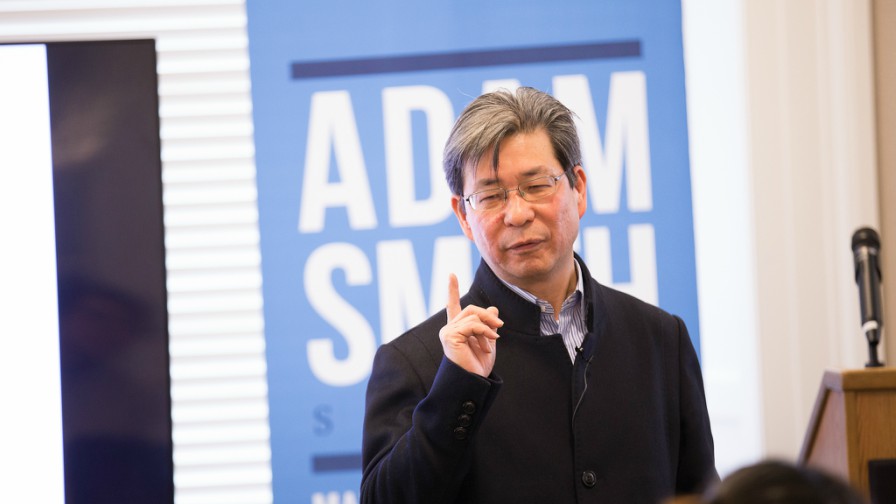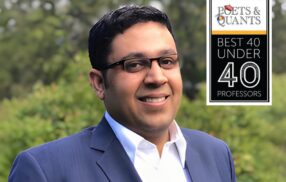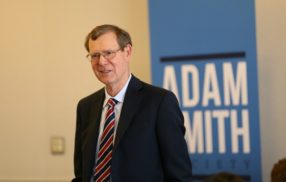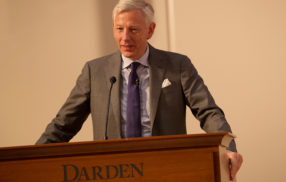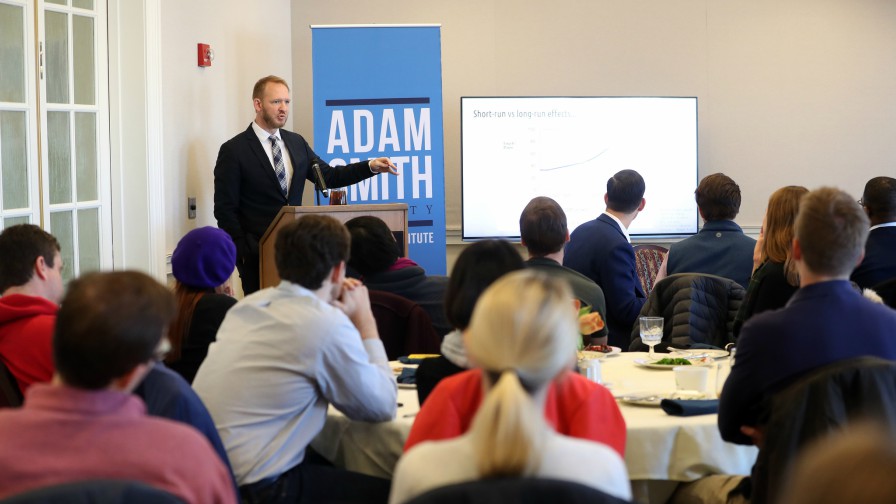
Exploring the Future of Bitcoin, China and Human Work as ‘Optional’
By Dave Hendrick
The technological tools enabling a revolution that is rapidly eliminating or remaking traditional modes of work are no longer on the horizon. They are here now.
Speaking at the University of Virginia Darden School of Business, Ryan Avent, a senior editor at The Economist, said the shift, which will have a dramatic impact on everything from transportation to manufacturing to medicine, closely resembles the seismic shifts of the Industrial Revolution, when a host of new production methods brought changes to the nature of work that ultimately influenced huge portions of modern life.
Avent spoke at the Darden School as part of the Darden chapter of the Adam Smith Society‘s Liberty Week, a series of events exploring the role capitalism plays in global economic systems. This year’s programming was varied and expansive, with speakers including Securities and Exchange Commissioner Michael Piwowar and Emerging Capital Partners Managing Director Carolyn Campbell, among others, grappling with the future of work, the rise of cryptocurrencies and China’s growing economic clout, among other topics.
Avent said technologies like machine learning and big data are enabling the shifts in modes of work .
“If you were to go back 10 years ago and talk to technologists, they would have said many of these changes are 30 or 40 years away,” Avent said, referring to driverless cars specifically. “It’s kind of astonishing that we are at this point.”
While the specific technological territory may be uncharted, Avent harkened back to previous epochs in order to derive points of comparison. Issues related to what happens when machines replace jobs and debates about the role the state should play in peoples’ lives were hallmarks of the Industrial Revolution, he said.
“Understand that as technology changes, governments have to adapt,” Avent said. “We are going to get things wrong and the cost when we get things wrong is quite high.”
Avent described the three ways societies work out how to respond to technological change as “politics, politics, politics.” He said one “happy version” of the future is one in which income is sufficiently shared among a population, leading to what he described as “huge growth in the artisanal economy” led by “semipro entrepreneurs.”
With a guaranteed income, Avent suggested one would be free to follow their passion of opening a small brewery, for instance, but would not need to rely on the income.
Avent, author of the recently published book The Wealth of Humans, said it was hard to imagine the concept of a universal basic income becoming part of the political discussion in the near term, but said the “end point of artificial intelligence is a world in which human labor is kind of optional.”
China’s Rising Clout
Darden students also heard reports about the flipside of capitalism from Y.P. Chan, a principal at the investment and advisory firm Chanden Inc. Chan offered a snapshot of economic growth under strict governmental controls in China.
Chan moved to the U.S. in 1978, leaving behind a village he described as having one telephone for 3,500 people, to pursue a career that included an MBA from Columbia, stints at companies like Honeywell and IBM, and leadership of a small technology firm. His departure from the country coincided with its economic rise, Chan said, with billions of people pulled out of poverty by rising standards of living and sustained economic development.
Chan said China achieved its current footing, in which a number of key economic metrics are now equal to or ahead of the U.S., by keeping tight reins on political reforms while opening the door for capitalist innovation, a model he contrasted with the path taken by Russia.
“Looking back, China did a very brilliant thing. It moved away from communist ideologies and started to embrace capitalism but at the same time it did not give up control,” Chan said. “The Soviets moved too fast and did political and economic reform at the same time.”
Chinese leaders took elements of western democracy and Confucianism and created their own model, one underscored by three pillars of culture, strategy and execution, Chan said.
Chan reeled off a number of facts and statistics to indicate the country’s current position of strength and growing global influence, noting that China will soon be the only country with a space station in orbit in the near future, for instance.
Chan recommended Western business leaders and students develop a sense of humility when considering their role in the world, noting that the entirety of U.S. history was shorter than the average dynasty of the 5,000 year old country.
On Blockchain and Bitcoin
The Liberty Week activities also included a workshop on bitcoin and blockchain facilitated by Aaron Fernstrom (GEMBA ‘15), associate director of the Richard A. Mayo Center for Asset Management.
Fernstrom, co-author of An Introduction to Blockchain and Bitcoin: Investment or Illusion, helped walk students and faculty through the basics of blockchain as well as the dizzying present and opaque future of bitcoin.
Fernstrom described blockchain as “a new platform technology enabling an improved ability to verify and record the exchange of value amongst an interconnected set of users” — at its simplest, a new way to track the ownership of assets before, during and after any transaction.
While blockchain has generated great interest from a host of sources, with such firms as IBM and JPMorgan openly developing their own applications, cryptocurrencies have engendered a good deal of skepticism, with bitcoin alternately lauded in the mainstream press as a critical currency of the future and pilloried as the most irrational of bubbles. Fernstrom cautioned the audience not to confuse features of blockchain that are valuable to industry with the speculative mania that has been present in many cryptocurrencies.
The currency has seen its price fluctuate wildly in recent months as more speculators flood into the market. Indeed, Fernstrom, who described bitcoin as “a piece of computer code and human imagination,” displayed a chart showing the recent spike in speculative trading versus the actual use of bitcoin to buy or sell goods, which remains low.
An admitted skeptic of cryptocurrencies who stressed he was only expressing his own opinion, Fernstrom said he believes the value of most of them will ultimately drop. As they have no intrinsic value, there does not appear to be a way to price them and countries might ultimately ban anything that could interfere with or subvert their own monetary policy goals.
When it may occur or how precipitous that drop may be is unknown, Fernstrom said, even if the end point seems clear.
Said Fernstrom, “Who knows where bitcoin goes before it goes to zero … but it’s going to zero.”
The University of Virginia Darden School of Business prepares responsible global leaders through unparalleled transformational learning experiences. Darden’s graduate degree programs (MBA, MSBA and Ph.D.) and Executive Education & Lifelong Learning programs offered by the Darden School Foundation set the stage for a lifetime of career advancement and impact. Darden’s top-ranked faculty, renowned for teaching excellence, inspires and shapes modern business leadership worldwide through research, thought leadership and business publishing. Darden has Grounds in Charlottesville, Virginia, and the Washington, D.C., area and a global community that includes 18,000 alumni in 90 countries. Darden was established in 1955 at the University of Virginia, a top public university founded by Thomas Jefferson in 1819 in Charlottesville, Virginia.
Press Contact
Molly Mitchell
Associate Director of Content Marketing and Social Media
Darden School of Business
University of Virginia
MitchellM@darden.virginia.edu


